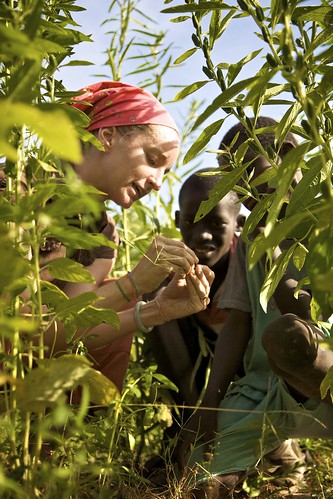
Peace Corps volunteers find themselves in a variety of locales covering a wide range of issues related to agriculture, education and health. And when they return, many of them have the opportunity to apply their Peace Corps experience to their professional lives back in the States. USDA’s Foreign Agricultural Service (FAS) boasts a large number of Returned Peace Corps Volunteers (RPCVs) working in a variety of program areas from scientific affairs to capacity building. In honor of Peace Corps Month and the 50th anniversary of the Corps, it is fitting to look at some of the Agency’s RPCVs and how their service in the Peace Corps has benefited their work at USDA.
Caitrin Martin was a Peace Corps volunteer working as a sustainable agriculture extension agent in Senegal from 2007 to 2009. Over the course of two growing seasons, Caitrin worked with several farmers in a few small villages in Senegal to do field trials on improved seed varieties for sorghum, millet and cowpeas. Using good agricultural practices such as timely weeding and thinning, mulching, integrated pest management and proper application of agrochemicals, farmers were able to significantly improve crop yields in these test plots.
“I found my service to be a challenging and extremely rewarding experience that taught me a lot about agriculture, community dynamics, West African culture, and a little about my own strengths and weaknesses,” said Martin. “Throughout my service, I gained a tremendous appreciation for the work of FAS’s primary stakeholders - the growers - and the remarkable challenges they face in producing food that meets safety specifications for international trade.”
Caitrin currently works on trade barriers related to pesticide residue standards in FAS’s Office of Agreements and Scientific Affairs. An image of Caitrin at work in Senegal served as the inspiration for a Peace Corps anniversary print by artist Shepard Fairey.
Not all of the RPCVs working within FAS served on agriculture projects during their service, but for one former Corps volunteer, U.S. agriculture got them to where they needed to be. This was the case for Ben Rau, who served in El Salvador from 2002 to 2004 and focused his efforts on water and sanitation. Ben currently works in FAS’s Office of Capacity Building and Development. When he first arrived in El Salvador, he needed to arrange a ride to the rural farming community of his host family, who were subsistence farmers.
“I ended up hitching a ride with a truck driver who just happened to be taking a shipment of Food Aid which contained rice, corn and oil provided by, among others, the U.S. Agency for International Development,” said Rau. “While I do not currently work on food aid projects, I think about that ride every time food aid comes up in a discussion.”
The experiences of both Caitrin and Ben are great examples of how FAS truly connects U.S. agriculture to the world. To learn more about FAS, visit www.fas.usda.gov.
